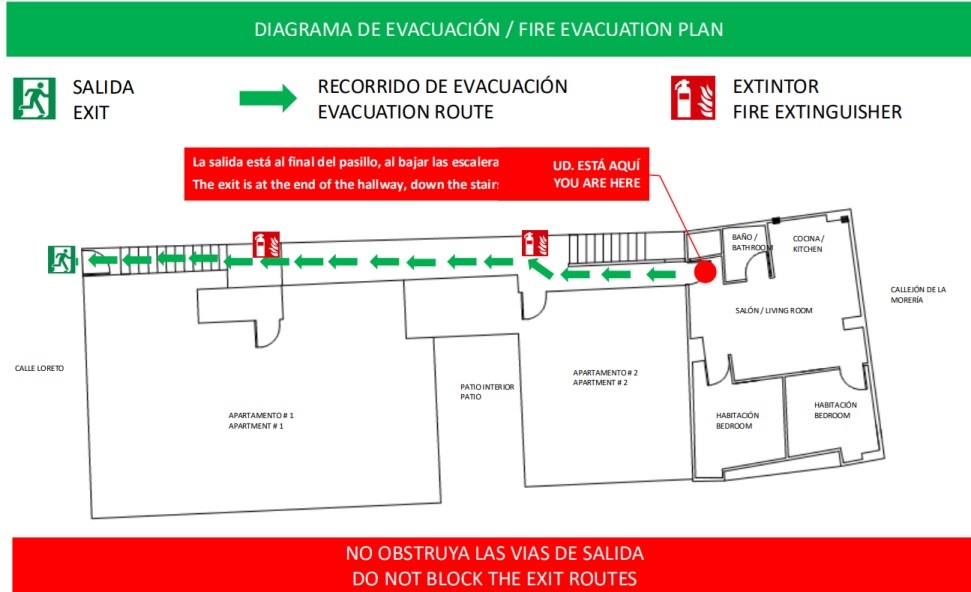Just in case there is a problem or emergency in the apartment…
Breakdowns and malfunction of equipment
If there is any malfunction, breakdown, or issue in the apartment, please contact us and we will do our best to resolve it as soon as possible: Phone +34 672 656 782 or alternatively email: deniavacation@gmail.com
Emergency Evacuation Plan
Please, familiarize yourself with this evacuation plan and escape route. It is posted behind the main apartment door.

In Case of Fire
- Call the firemen. Fire station phone: 112. If you detect a fire, once you have notified the Firemen and if you feel capable, take down a fire extinguisher and put out the fire. Do not take risks when extinguishing it and always have a guaranteed exit.
- Fire extinguishers are in the aisle outside the apartment. Fire extinguishers provided (2 units) are suitable for Class A, B, and C fires.
- Class A fires involve solid organic materials such as paper, wood, or textiles.
- Class B fires involve flammable liquids like gasoline, alcohol, or cooking oil.
- Class C fires involve flammable gases and electrical equipment.
- Important: Never use water to extinguish an electrical fire. Always cut the power at the circuit panel first. In many cases, simply cutting the electricity can stop an electrical fire.
- To use a fire extinguisher:
- Pull out the safety pin.
- Aim the nozzle at the base of the flames.
- Press the trigger.
- Sweep the jet from side to side until the fire is extinguished.
- Combustion of plastic materials can result in the emission of toxic gases. In the presence of combustion gases, evacuate the apartment immediately following the escape route above.
Water Emergency
- The main water valve is just outside the kitchen window and can be reached from inside. In case of a leak in the apartment, please turn this valve off and contact us as mentioned above.
Electrical Emergency
- The main electricity breaker is on the first floor, inside the metal box located on the right side at the top of the stairs. The breaker corresponding to the apartment is breaker No. 3.
- The internal apartment circuit panel is located inside the closet next to the apartment door. The main circuit breaker is the first one on the left side.
Seismic Emergency
Dénia is located in an area with low seismic activity. Statistics from the last 10 years show that 97.7% of the seismic events were below or around M2 on the Mercalli scale, and only 0.08% reached M4. No strong earthquakes have been recorded during this period. The seismic events experienced have caused no material damage and were mostly imperceptible to the population.
Follow instructions from local authorities and emergency services. In the event of a strong tremor or earthquake:
- Stay calm! Do not run. If you are indoors, stay inside. If you are outside, stay outside. Once the shaking stops, carefully exit the building if it is safe to do so.
- If you are indoors crawl under a sturdy piece of furniture (usually a desk or table) or stand in a doorway or next to an interior wall. Stay away from windows, mirrors, and objects that could fall.
- If you are outdoors, stay in the open away from power lines or anything that might fall. Stay away from buildings (stuff might fall off the building or the building could fall on you).
- Blackouts are frequent after earthquakes. Do not use matches, candles, or any open flame. If illumination is needed, use a battery-powered lantern or the flashlight on your mobile phone.
- Turn off the gas service if applicable (Please note that this apartment is not connected to a gas service).
- After the earthquake, evacuate the building using the escape route indicated above.
- Keep in mind that aftershocks—smaller tremors following the main earthquake—are common and may continue for some time. Stay alert and be cautious.
- Check yourself and others for injuries. Provide first aid for anyone who needs it.
- Check water, gas, and electric lines for damage. If any are damaged, shut off the valves. Check for the smell of gas. If you smell it, open all the windows and doors, leave immediately, and report it to the authorities (dial 112).
- Turn on the radio to get information. In case of a blackout, if you don’t have a battery-operated radio, you can use the car radio. Please refrain from using your mobile phone unless absolutely necessary, as phone lines are often congested and must remain available for emergency communications
- Stay out of damaged buildings.
- Be careful around broken glass and debris. If possible, wear appropriate clothing and boots or sturdy shoes to avoid cutting your feet on nails or other sharp objects.
- Be careful of chimneys and balconies (they may fall on you).
- Stay away from beaches. Tsunamis can sometimes occur after the ground has stopped shaking. If you are near the coast and feel a strong or prolonged earthquake:
- Immediately move to higher ground or inland, away from the shore.
- Do not wait for an official warning—natural signs can be your only alert. These may include the sudden receding of water from the coast, exposing the ocean floor, reefs, and fish, or a loud “roaring” sound coming from the sea, among others.
- Stay away from the coast until authorities declare it safe to return.
- Stay away from damaged areas.
- Follow the instruction of the local authorities.
